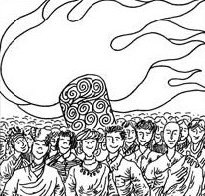
I have recently read a lot about the people who cry out for "Tibetan independence". They state their objectives with such hatred and violence that it arouses second thoughts about their true character.
They have even gone so far as to attempt to grab the torch out of the hands of Chinese wheelchair-bound torch-bearer Jin Jing in Paris on Monday. They lurched at Jin and her two companions, one of whom is suffering from impaired eye-sight. They nearly knocked Jin out of her wheelchair. You could see the hate and rage in their eyes on TV.
I have to wonder if these people really represent the Tibetans I have met over the years, whose straightforwardness, kindness and passion still influence my way of looking at the world. I am still proud of the fact that I have spent more time in the Tibet autonomous region than I have ever in Shanghai.
I have visited many Tibetan homes. The most memorable of all was to folklorist Samzhub, who lives in a valley of Gonggar, about 80 km from Lhasa.
There, my colleagues and I heard Samzhub, now 86, share his life experiences with us as a Tibetan ballad singer of Gesar, a classical Tibetan epic about a legendary Tibetan hero who fought evil and restored peace and harmony to his people.
Before we said goodbye, Samzhub put on his new festival dress, placed a new carpet on an open ground not far from his house, and insisted that we sit down and share with him his home-made highland barley wine. I do not drink, but that day, I gave in to his kindness and sincerity. Surrounded by fields of green barley interspersed with yellow rape flowers, and a snow-capped mountain under a blue sky, I drank to my heart's content.
I have also interviewed many Tibetans, from doctors practicing both Tibetan and Western medicine, to lawyers, agronomists, technicians, writers, teachers, administrators, journalists and monks.
Every one of them had a story to tell.
In Xigaze, a grandmother still hung a portrait of the late Chairman Mao Zedong in her new home.
Also in Xigaze, I talked with women from the local women's federation, and with others in the village. Camqo told me that in Old Tibet, the women were called "gyebmien", meaning something from the waist down. "We were not regarded as a human being but as an animal, a tool," she said.

In Shannan, I had a long talk with a woman doctor, Yufei, who has been a pioneer in treating coronary heart diseases at the local People's Hospital. Over the years, she had spent some time in Beijing to further her medical skills and knowledge.
In Lhasa, I visited a workshop where several young Tibetan men were learning to paint and create the famous Thangka paintings, almost all of them themes on Buddhism. Some of the budding artists told me that they wanted to master all the skills and then start their own workshops to pass the Tibetan folk art on to more young people.
In Nyingchi, I visited a new boarding school and discussed with the teachers on how to teach the children mathematics, many of the words were new to their classical Tibetan language.
The dreams, wishes and frustrations that the Tibetans shared with me were no different from those of the Va, Bai, Yi, Naxi, Hui, Uygur, Kazak and Mongolian people I have interviewed over the years in Yunnan, Sichuan, Ningxia and Xinjiang.
Despite their complaints, they all showed a determination to overcome difficulties in order to realize their dreams, because they are the true masters of their lives and their work.
Only ignorance cultivates hatred and vengeance.
E-mail: lixing@chinadaily.com.cn
(China Daily 04/10/2008 page8)

